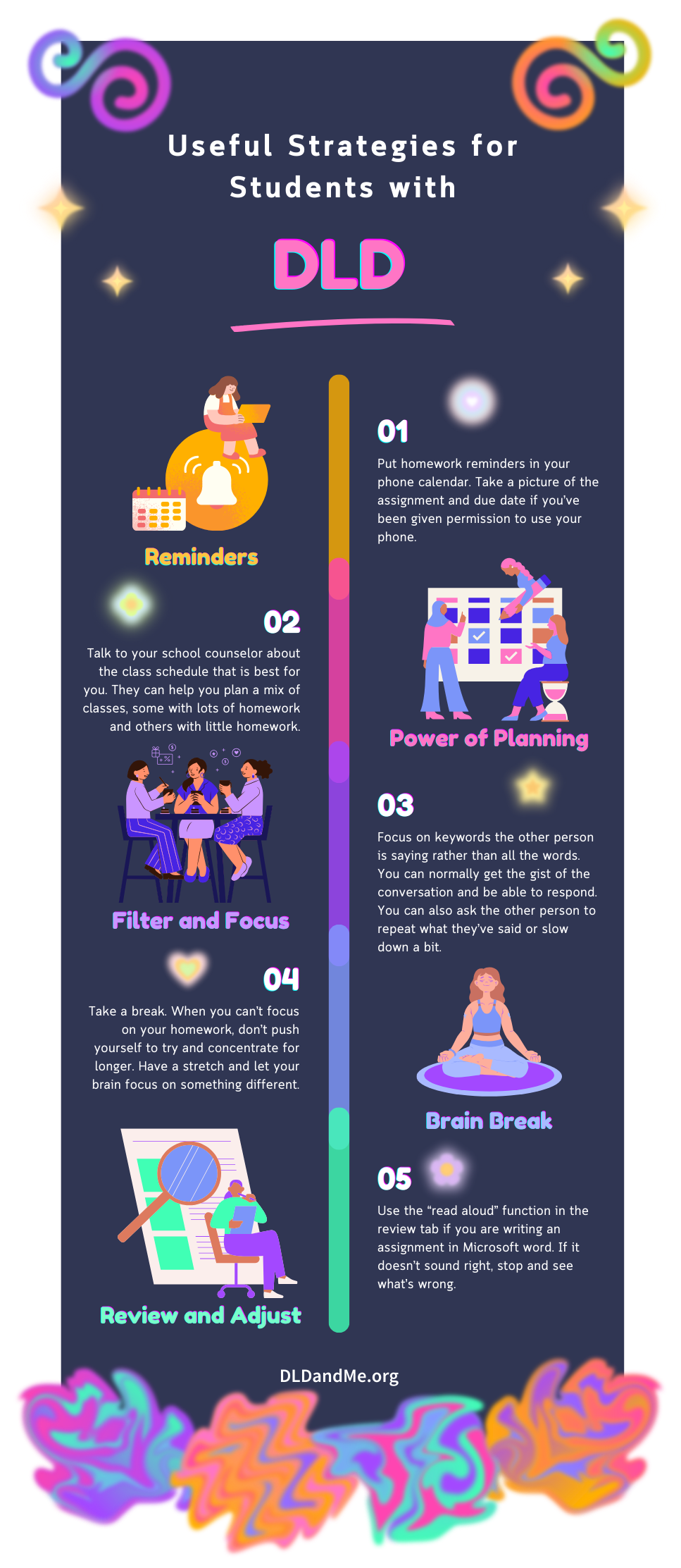Useful Strategies for Students with DLD in the Middle School, High School, and College Environments
Developmental Language Disorder (DLD) is different for everyone who has it. Your language difficulties, strengths, school experiences, and friendships are unique. But maybe someone with DLD uses a strategy that can help you too. Here are some strategies that older children, adolescents, and adults have shared.
Keeping up with conversations can be difficult. To help you could try to:
Focus on key words the other person is saying rather than all of the words. When doing this you can normally get the gist of the conversation which is enough to then be able to respond.
Fiddle with something such as your hands or your hair might help you stay focused on the words the other person is saying.
Ask the other person to repeat the question or to slow down a bit.
Homework might be harder to remember or take you longer than it takes your friends. To help, you could try to:
Put homework reminders in your phone calendar. You might take a picture of the assignment and due date if the teacher wrote it on the board. Of course, you first need to ask permission to use your phone in class.
Use the Sticky notes app for writing down your homework if you are allowed to use a laptop in class. The ‘sticky note’ you create will stay on your desktop until you delete it.
Talk to your school counsellor about the class schedule that is best for you. They can help you plan a mix of classes, some with lots of homework and some with little homework. That way, any one term is not so overwhelming.
Take a break. When you can’t focus on your homework, don’t push yourself to try and concentrate for longer. Have a stretch and let your brain focus on something different. Giving yourself a short break will help you concentrate again more easily.
Writing essays can be tough. To help you could try to:
Make sure you understand the question. Do you need to describe, explain, analyze, or evaluate? If you’re not sure what type of question is being asked, then ask someone before you start.
Make a plan for your essay before you write. It can be visual– use color, simple drawings, and key words rather than lots of words.
Reread the question often to make sure you stay on topic.
Proofread. When you are focused on the information you want to write about, it can be hard to use accurate grammar and spelling. Proofread and make corrections afterwards.
Use the “read aloud” function in the review tab if you are writing your essay in Microsoft word. It will read your essay back to you. If it doesn’t sound right, stop to see what’s wrong. Maybe you left out a word, misspelled something, or forgot a punctuation mark.
These are all strategies that YOU can try. But sometimes, it is helpful if OTHER PEOPLE use strategies when talking to you. They might try:
Repeating the key points.
Saying only one or two instructions at a time.
Asking you to repeat what you need to do rather than asking you if you understand.
Providing a list of curriculum words and their meanings or providing a written outline of a lesson.
It might help to tell others that you have DLD.
Tell them the strategies that help you. For ideas about how to tell others you have DLD, click here. Sometimes your strategies might not be enough. You might need extra support to succeed at school or at work. Students in the preschool to high school years may qualify for an Individualized Education Program or 504 plan. If you are in college or university, learn about accommodations here. Under the Americans with Disabilities Act, accommodations also apply to the workplace.




